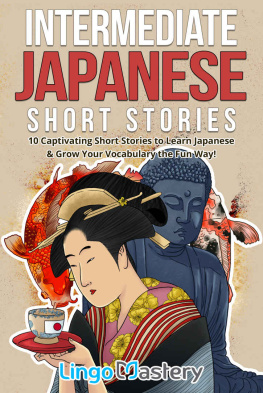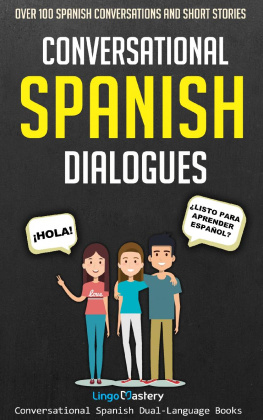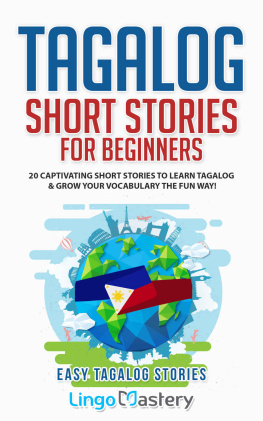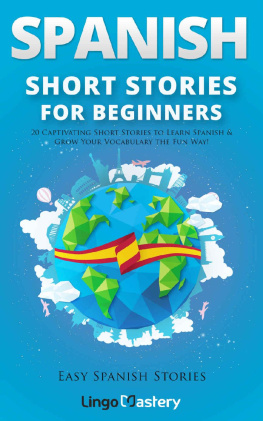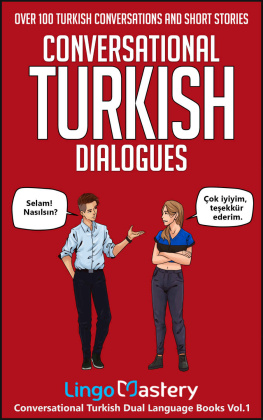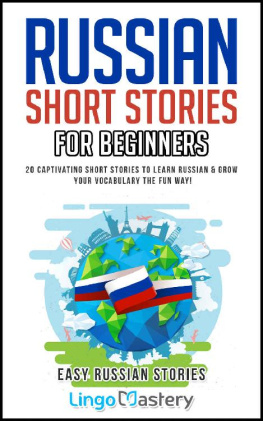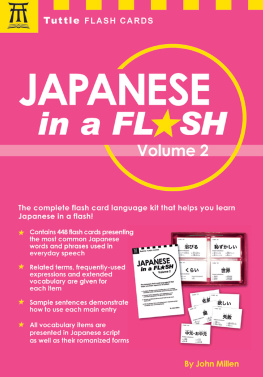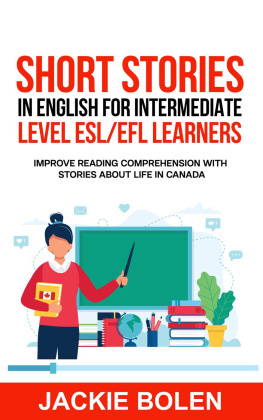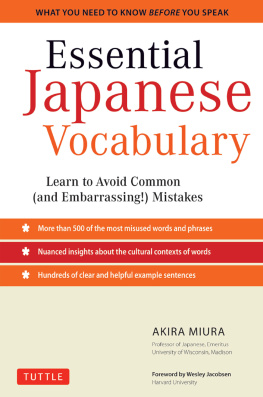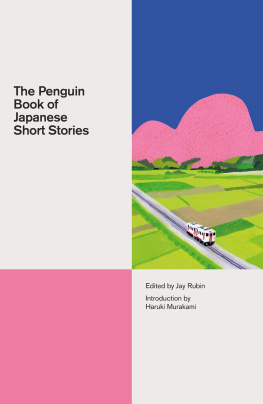Lingo Mastery - Intermediate Japanese Short Stories: 10 Captivating Short Stories to Learn Japanese & Grow Your Vocabulary the Fun Way! (Intermediate Japanese Stories Book 1)
Here you can read online Lingo Mastery - Intermediate Japanese Short Stories: 10 Captivating Short Stories to Learn Japanese & Grow Your Vocabulary the Fun Way! (Intermediate Japanese Stories Book 1) full text of the book (entire story) in english for free. Download pdf and epub, get meaning, cover and reviews about this ebook. year: 2021, genre: Detective and thriller. Description of the work, (preface) as well as reviews are available. Best literature library LitArk.com created for fans of good reading and offers a wide selection of genres:
Romance novel
Science fiction
Adventure
Detective
Science
History
Home and family
Prose
Art
Politics
Computer
Non-fiction
Religion
Business
Children
Humor
Choose a favorite category and find really read worthwhile books. Enjoy immersion in the world of imagination, feel the emotions of the characters or learn something new for yourself, make an fascinating discovery.
- Book:Intermediate Japanese Short Stories: 10 Captivating Short Stories to Learn Japanese & Grow Your Vocabulary the Fun Way! (Intermediate Japanese Stories Book 1)
- Author:
- Genre:
- Year:2021
- Rating:5 / 5
- Favourites:Add to favourites
- Your mark:
- 100
- 1
- 2
- 3
- 4
- 5
Intermediate Japanese Short Stories: 10 Captivating Short Stories to Learn Japanese & Grow Your Vocabulary the Fun Way! (Intermediate Japanese Stories Book 1): summary, description and annotation
We offer to read an annotation, description, summary or preface (depends on what the author of the book "Intermediate Japanese Short Stories: 10 Captivating Short Stories to Learn Japanese & Grow Your Vocabulary the Fun Way! (Intermediate Japanese Stories Book 1)" wrote himself). If you haven't found the necessary information about the book — write in the comments, we will try to find it.
Lingo Mastery: author's other books
Who wrote Intermediate Japanese Short Stories: 10 Captivating Short Stories to Learn Japanese & Grow Your Vocabulary the Fun Way! (Intermediate Japanese Stories Book 1)? Find out the surname, the name of the author of the book and a list of all author's works by series.
Intermediate Japanese Short Stories: 10 Captivating Short Stories to Learn Japanese & Grow Your Vocabulary the Fun Way! (Intermediate Japanese Stories Book 1) — read online for free the complete book (whole text) full work
Below is the text of the book, divided by pages. System saving the place of the last page read, allows you to conveniently read the book "Intermediate Japanese Short Stories: 10 Captivating Short Stories to Learn Japanese & Grow Your Vocabulary the Fun Way! (Intermediate Japanese Stories Book 1)" online for free, without having to search again every time where you left off. Put a bookmark, and you can go to the page where you finished reading at any time.
Font size:
Interval:
Bookmark:
INTERMEDIATE
JAPANESE SHORT
STORIES
10Captivating Short Stories to Learn Japanese & Grow Your Vocabulary the FunWay!
IntermediateJapanese Stories

www.LingoMastery.com
Copyright 20 by Lingo Mastery
ALL RIGHTS RESERVED
No part of this book may bereproduced, stored in a retrieval system, or transmitted in any form or by anymeans, electronic, mechanical, photocopying, recording, scanning, or otherwise,without the prior written permission of the publisher.
Hello, reader!
If you are considering reading this book, thenyou must have made impressive progress in learning Japanese. Congratulations!Yet, please just dont bask in your success since that is one of the mostcommon mistakes that language learners often make. Constant challenge is thekey to perfection! We encourage you to continue to learn and challenge yourselfno matter how good you are.
This book consists of 10 Short Stories inJapanese, which were specially written for Japanese intermediate learners. Wehave made sure to provide you with a comprehensive experience in the Japaneselanguage as well as to expose you to rich and practical vocabulary, usefulgrammar structures, and commonly used expressions, which will take yourJapanese language knowledge and skills to the next level after reading these 10stories.
Reading is an important part of learning alanguage, which has, in fact, been proven to be one of the most efficient waysto learn a foreign language. Reading helps you become familiar with proper useof the language, such as grammar, fixed phrases, and word choice. In addition,research has shown that it exposes you to more sentences per minute than theaverage movie or TV show.
When creating this book, we tried making abalance between entertainment and challenge. Having come this far with yourJapanese language learning, we are sure that you are already familiar withbasic vocabulary as well as grammatical structures, which ensure you will enjoyreading. Yet, the book gives you much room for further growth exposing you tonew things and thus motivating you to move beyond the elementary level.
The 10 stories are fun, educational, andfilled with more advanced, helpful vocabulary combined with a variety ofintermediate-level grammar structures. In addition, a learning support sectionis provided at the end of each story, such as a word list, summary, and multiple-choicequestions about the story, which will enhance your understanding of the story,help you follow all its details, and improve at a rapid pace.
Since you have chosen this book for yourstudy, we assume you, as a reader, already know a fair amount of Japanesevocabulary. We sincerely hope that you will find this book entertaining forboth academic and casual reading.
Aboutthe Stories
Motivation is essential when it comes tolearning a foreign language. In order to keep your motivation, you need goodreading materials that are appropriate to your level as well as engaging andinformative. These reading materials should also provide you with anopportunity to learn and get used to grammar and vocabulary, which is importantfor intermediate and even advanced learners.
In each chapter, you will find a story,followed by the summary of the story that is rendered in both Japanese andEnglish. Then, you will find the vocabulary list and the learning-supportsection. The summary section provides you with the gist of a story, which will allowyou to make sure you do not miss out any important points in case you get lostwhile reading. Then, you can go to the vocabulary section, which provides youwith a list of words/phrases that we thought might be difficult or worthmemorizing--those words/phrases are bolded in each story. Finally, you can try yourluck with the learning-support section. In this section, you will find fivequestions about the story you just read. Please try to answer each questionwithout any help, and then you can check the answers, which is provided at theend of the learning-support section.
Please note that a full translation of eachstory is not provided in this book. This way, you cannot choose the easyoption even if you feel inclined to read an English translation to avoidstruggles in order to fully understand the story in Japanese. Struggles areoften needed to make significant progress in the learning process.
Suggested steps to working with this book
First, read through the story. Chances are youalready know most words in it, so dont be discouraged if you see many words inbold.
Once you have read through it, read it againreferring to the vocabulary list. Note that our vocabulary lists are mucheasier to refer to than a conventional dictionary because:
a. the words are listed in order of their appearance in the text;
b. the translation as well as the pronunciation are provided;
c. Set phrases are given as they are usually and naturally used so thatyou can use them for yourself.
Now that you think you have understood the majorplot of the story, check yourself by referring to the summary of the story thatis provided in both Japanese and English.
Go to the learning-support section and try toanswer the questions provided if you have understood the details.
Check your answers by referring to the answersection.
Finally, its time to enjoy the story! Read thestory once more and have fun reading the story without any struggle. Youdeserve it!
Tipsto Improve Your Reading
Reading is a complicated skill. Think of howyou learned to read in your first language. It must have taken years for you tomaster the skill from how to read the most basic words to the most complicatedtexts. You have built a complex set of micro skills through studying thelanguage that now allow you to read various texts at a different pace and withdifferent levels of understanding.
However, research suggests that this doesnthappen when you read in a foreign langauge. You cannot rely on all these microskills that allow you to understand texts in your first langage and start tofocus on understanding the meaning of every single word. Therefore, this causesintermediate learners to easily get frustrated with not being able tounderstand everyting in the text since their vocabulary is limited. Advancedlearners, on the other hand, have overcome this problem, yet they also need tocontinue reading in order to keep themselves in shape.
Here are a few useful tips:
The first tip is to try to stop instantlyfrustrated or discouraged with unknown words. Try to read a full page or evenjust one paragraph before stopping to look up words in a dictionary. Even ifyou dont know the exact meaning of a word, you could probably guess what itmeans from the context. Once you have gotten used to it, you could improve yourreading speed as well as your fluency.
It is important to commit yourself to reading atleast a page per day. Some days, you may feel like you dont want to readanything. But, once you have gotten in the habit of reading, it will be part ofyour life. Remember, the more you read, the faster and better you will improveyour skills.
Once you have read through all the stories, keepcoming back to them! You will be amazed at how much better you understand eachstory on your own the second time around. But at the same time, you willrealize that there are more things, such as grammar, fixed expressions, or setphrases, that you can learn from each story, which you might have missed onyour first time reading.
If you dont know a word that is not in bold (i.e., not included in the vocabulary list) ,then:
Font size:
Interval:
Bookmark:
Similar books «Intermediate Japanese Short Stories: 10 Captivating Short Stories to Learn Japanese & Grow Your Vocabulary the Fun Way! (Intermediate Japanese Stories Book 1)»
Look at similar books to Intermediate Japanese Short Stories: 10 Captivating Short Stories to Learn Japanese & Grow Your Vocabulary the Fun Way! (Intermediate Japanese Stories Book 1). We have selected literature similar in name and meaning in the hope of providing readers with more options to find new, interesting, not yet read works.
Discussion, reviews of the book Intermediate Japanese Short Stories: 10 Captivating Short Stories to Learn Japanese & Grow Your Vocabulary the Fun Way! (Intermediate Japanese Stories Book 1) and just readers' own opinions. Leave your comments, write what you think about the work, its meaning or the main characters. Specify what exactly you liked and what you didn't like, and why you think so.

